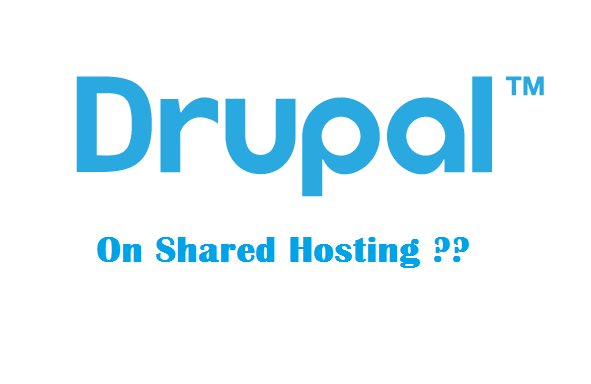Can Shared Hosting handle Drupal based Website Load?
Drupal is a very powerful content management system (CMS). We can create very large scale websites in Drupal which is not possible in WordPress. This is because Drupal has more functionality, powerful features, scalable and more customizable than any other CMS. The main issue in developing a drupal based site is that drupal is somewhat difficult to understand. It has a steep learning curve and is very complex in system. On the other hand wordpress is very easy to work with and any non technical person can understand the basic working and functionality of wordpress in hours.
The other issue with drupal is that it is a resource hog. You will need a decent server or hosting to handle a drupal website. So what about the people who can only afford shared hosting but want their website to be in drupal. The question here arises that ‘Can a Shared hosting handle a Drupal website?’. The answer to that question depends on following factors mentioned below.
Website Complexity
The more is the functionality or complexity of a website the more resources it will consume. If you are making a simple drupal website having only 5 – 6 pages (Static nature) then it is fine for shared hosting to handle it given that the number of visitors are less.
Traffic
It is the most important factor in evaluating website performance. In Internet terms Traffic means number of visitors engaging or visiting your website in a given specific time or period e.g 1000 visits per day or 30k visits per month. Generally traffic is calculated on daily and monthly basis. If your website traffic is on higher side on your drupal website than it will put extra load on your hosting consuming more memory and cpu. All Shared hosting have a limitation on the usage of resources that includes CPU, Memory and Disk space.
Theme
If you use a fancy theme with all the eye candy and loads of javascript and jquery in it then it will bring your website performance to its limit and puts extra load on the shared hosting. So use a light and simple theme (minimal) if you want to survive on shared hosting with drupal.
Number of Modules
Modules are used to increase Drupal’s functionality. Each module in drupal consumes some resource with it so if you use too many modules in your site than it will bring the shared hosting to its knees resulting in the suspension of your hosting account. So keep the third party modules to minimum.
Cache Technology Used
Cache is used to improve drupal’s website page load time thus making it to use less resources at a given time. Drupal comes with its in-built cache system where it has two cache modes options normal and advanced. The advanced mode cache system makes the website load much faster but it has some issues involving compatibility with some modules and is generally not recommended for live websites. There are some very good third party cache modules also available namely Boost and Memcache that are used to speed up drupal website. For shared hosting users I recommend them to use Boost module on their drupal websites because it generates static html files for your recently accessed pages thus making them load swiftly. The pages or cache get updated accordingly to the expiration time that you have set in the boost module.
Click here to download Boost Module
Drupal Version
You can use Drupal 6 to run on your shared hosting but never ever think of using Drupal 7 to use it on your shared hosting. Drupal 7 is pretty heavy as compared to Drupal 6 in terms of resource consumption or usage.
So after considering all these points I would say that a shared hosting can handle a Drupal website if all these above mentioned points are kept checked or kept in limit. Also the shared hosting should also be compatible and good enough for a drupal based website. The two such shared hosting companies that I recommend for using Drupal are Bluehost and Hostagator. You can sign up for them from the links given below.
Top Two Shared Web Hosting for Drupal
Bluehost – Click here to Sign up for Bluehost
Hostagator – Click here to Sign up for Hostgator

